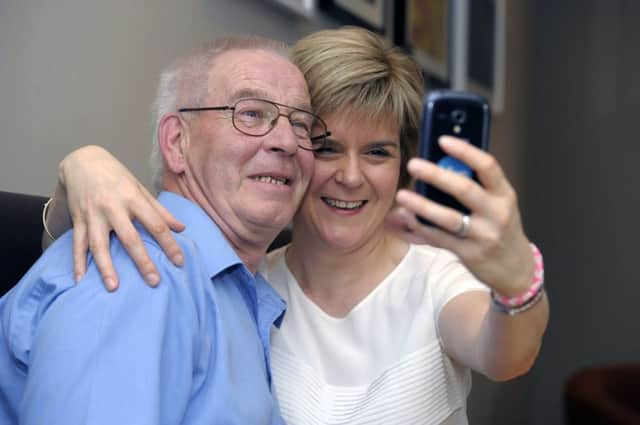Sturgeon: Politicians on Twitter need ‘thick skin’


The deputy first minister insisted only a “tiny minority” of people were misusing sites like Facebook and Twitter, but admitted one of the downsides of social media is that it has given people a new platform to abuse others.
Ms Sturgeon, who was speaking at the Edinburgh Festival Fringe, said she had taken “a lot of convincing” to join Twitter, where she now has almost 50,000 followers, and insists on being responsible for her own tweets.
Advertisement
Hide AdAdvertisement
Hide AdIt emerged last year that Ms Sturgeon had received repeated death threats from the same individual - but had decided to block all communications with the individual rather than go to the police.
During an interview with playwright David Greig at the lunchtime cabaret show All Back To Bowie’s, Ms Sturgeon said she advised young people considering a career in politics to “follow a belief”, but said they also needed to have “a thick skin and the ability to take criticism and not allow it to set you back too much.”
She said: “I was one of these people that took quite a lot of convincing that it was a sensible thing to join Twitter. When I did decide to start tweeting I decided I was always going to do it myself because if I ever got into trouble on Twitter I wanted it to be my mistake, not somebody who was tweeting on my behalf. I enjoy it, it’s a really good way of getting across to people.
“Everybody in public life, and probably a lot not in public life, gets abuse on Twitter. It is one of the downsides of that medium. But it is a tiny minority of people who engage in that kind of behaviour. Mostly it is positive and people will disagree, but they will do it politely and perfectly civilly.
“The minority who will abuse folk on Twitter have always been there, it’s just that they’ve not had the platform before. We shouldn’t get upset about it. I just ignore it and try not to read it.”
Meanwhile Ms Sturgeon said her “least favourite” part of the independence campaign was the controversial STV debate she conducted with Scottish Labour leader Johann Lamont, a heated head-to-head many critics dubbed “a stairheid rammy.”
Ms Sturgeon said: “Both of us have talked spoken about it. If we could turn the clock back, both of us would try to do it very differently. Whether we would succeed or not, I don’t know.
“Inevitably these TV debates are adversarial, that’s how they are set up to be.”
Advertisement
Hide AdAdvertisement
Hide AdMs Sturgeon said she “much preferred” speaking at traditional political debates and public meetings to TV debates.
“You can engage in a debate that is more nuanced and you can get into arguments in a way that is much more about addressing people’s genuine concerns than you can in the heat of a TV studio when it is ‘he says, she says’ and everything is black and white.
“My experience of all the public meetings I am doing is that they are packed out. Attendance is determined by the size of the venue.
“Whatever side of the debate you are on, one of the wonderful things about it is that there is a re-engagement in politics. My rough estimate is that at most of these meetings around a third to a half of people there are undecided.
“The thing I like most about doing public meetings as opposed to television is that you can have a debate about certainty versus uncertainty in a way that is not black and white.”